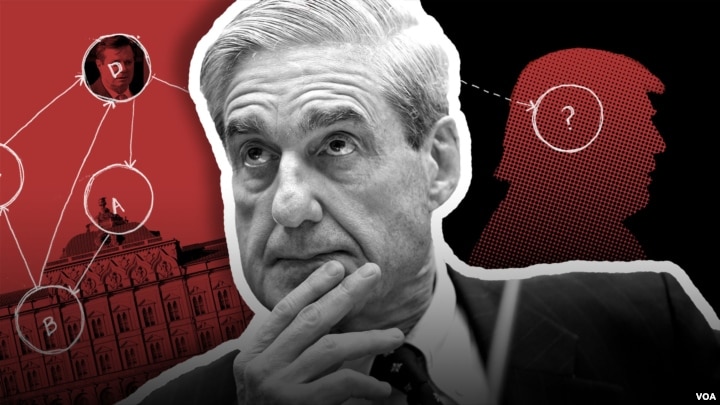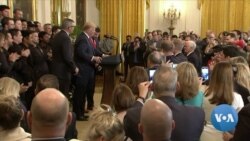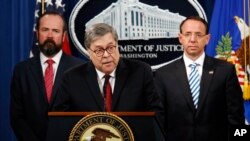Special counsel Robert Mueller investigated 11 instances in which he suspected that President Donald Trump had obstructed justice by trying to thwart his investigation into Russian meddling in the 2016 election, but ultimately decided he could neither bring charges nor exonerate Trump.
The 448-page report released Thursday concludes there is no evidence that Trump or his campaign aides coordinated with Russians to interfere on behalf of Trump’s 2016 presidential election campaign against Democrat Hillary Clinton. While the investigation documented many links between people with ties to the Russian government and individuals involved in the Trump campaign, “the evidence was not sufficient to support criminal charges,” Mueller wrote.
However, the report cites numerous efforts by an angst-ridden Trump to derail or impede the federal probe of suspected Russian meddling in the campaign.
Mueller found that in June 2017 Trump asked White House Counsel Don McGahn to pursue Mueller's removal by the Justice Department in the midst of the prosecutor's investigation, but that McGahn refused the president's directive. Mueller said that McGahn feared that the prosecutor's dismissal would provoke a U.S. constitutional crisis reminiscent of the 1973 Saturday Night Massacre at the height of the Watergate scandal when President Richard Nixon fired top Justice Department officials.
In other instances, Mueller investigated Trump's firing of former FBI director James Comey, who led the Russia investigation before Mueller's appointment; efforts to force then-Attorney General Jeff Sessions to take control of the investigation after he had already recused himself; dangling a possible pardon of Trump campaign chairman Paul Manafort for financial crimes he has been sentenced to prison for, and demands that McGahn deny that he had asked him to seek Mueller's ouster.
WATCH: Mueller Report Raises New Questions About Trump Obstruction
The report said Trump's attitude toward Michael Cohen, his former personal attorney, changed from "praise" to "castigation" after Cohen admitted that he lied to Congress about pursuing construction of a Trump Tower in Moscow long after Trump was telling voters in early 2016 that he had ended his Russian business ventures.
The report said that Trump at first publicly asserted that Cohen would not turn against him and privately passed messages of support to him. "But after Cohen began cooperating with the government in the summer of 2018, the president publicly criticized him, called him a 'rat,' and suggested that his family members had committed crimes," the report said.
Mueller said, however, he could not reach a definitive decision on the obstruction issue. Attorney General William Barr reiterated Thursday as the report was released that no obstruction charges are warranted.
Mueller said in his report that "If we had confidence after a thorough investigation of the facts that the president clearly did not commit obstruction of justice, we would so state. Based on the facts and the applicable legal standards, however, we are unable to reach that judgment."
"The evidence we obtained about the president's actions and intent presents difficult issues that prevent us from conclusively determining that no criminal conduct occurred," Mueller said. "Accordingly, while this report does not conclude that the president committed a crime, it also does not exonerate him."
Part of Mueller’s problem in reaching a decision on obstruction of justice was Trump’s refusal to participate in a face-to-face interview with prosecutors. Instead, the president would only agree to provide written responses to questions posed by the prosecutors, under pre-arranged ground rules. Mueller’s final report contains 12 pages of Trump’s written responses.
Mueller's report said prosecutors didn't subpoena Trump because it would have created a "substantial delay" at a "late stage" in the investigation. But it said Mueller and his team of prosecutors viewed Trump's written answers as "inadequate."
In early 2018, after news organizations reported about Trump's order to McGahn to seek Mueller's ouster by the Deputy Attorney General and his refusal to comply, the Mueller report said the president told McGahn "to dispute the story and create a record stating he had not been ordered to have the special counsel removed."
When Trump raised the issue again, questioning why McGahn had told Mueller about his demand to dismiss the prosecutor, "McGahn refused to back away from what he remembered happening and perceived the president to testing his mettle,” according to the report.
From the start of Trump's presidency in January 2017, Mueller portrays a besieged White House. Mueller said Trump "reacted negatively" to Mueller's May 2017 appointment by Deputy Attorney General Rod Rosenstein to take over the Russia investigation after Comey's firing.
Trump told advisers that it was "the end of my presidency," the report said.
At a news conference shortly before the report went public, Barr told reporters that it cleared Trump, campaign officials and any Americans of conspiring with Moscow. While Mueller declined to clear the president of obstructing the probe, Barr said he and Rosenstein had reviewed the report's evidence and determined that Trump had not committed an obstruction offense.
Barr asserted that Trump was motivated by "frustrated and angered by a sincere belief that the investigation was undermining his presidency, propelled by political opponents, and fueled by illegal leaks." In addition he said the president provided access to campaign and White House documents and allowed aides to freely testify.
Barr concluded, "Apart from whether [Trump's] acts [as president] were obstructive, this evidence of non-corrupt motives weighs heavily against any allegation that the president had a corrupt intent to obstruct the investigation."
As the special counsel’s report was being released, Trump declared in the White House East Room that “I’m having a good day, too. It’s called no collusion, no obstruction.”
Opposition Democrats protested that Barr held the news conference before the report was made public, saying it was an attempt to spin Mueller's findings into a favorable view of Trump's role.
House Speaker Nancy Pelosi and Senate Democratic leader Charles Schumer said in a statement they "believe the only way to begin restoring public trust in the handling" of the Mueller investigation was for Mueller himself to testify publicly before congressional panels "as soon as possible."
Moments after Barr finished speaking, House Judiciary Committee Chairman Jerrold Nadler called for Mueller to testify before his panel no later than May 23.
U.S. intelligence agencies in early 2017 assessed that Russia, at the direction of President Vladimir Putin, carried out a campaign to undermine the U.S. vote and had a clear preference for Trump to win..
The issues covered in the report are certain to endure in U.S. political discourse in the short-term, with Barr scheduled to testify before the Senate Judiciary Committee on May 1, followed by an appearance before the House Judiciary Committee the next day.
Looking to the longer-term, it is highly unlikely the investigation will fade to irrelevance before the next presidential election in November 2020.
In one measure of public demand for the information, several publishers are offering people the ability to purchase printed copies of the report, and pre-orders alone on Amazon's website ranked among its top 100 in book sales before the report was released.
What have long been public are the legal ramifications of Mueller's probe.
Five Trump campaign associates pleaded guilty or were convicted of a range of offenses and a sixth is awaiting trial, some for lying about their contacts with Russians during the 2016 campaign or just before he took office in January 2017 and some for offenses unrelated to Trump.
In addition, Mueller also charged 13 Russian nationals with trying to influence the 2016 election by tricking Americans into following fake social media accounts with material favorable to Trump and against his opponent, Clinton. Another dozen Russian military intelligence officers were charged with the theft of emails from Democrat Party officials. None of the Russians is ever likely to face a trial in the United States because the two countries do not have an extradition treaty.














